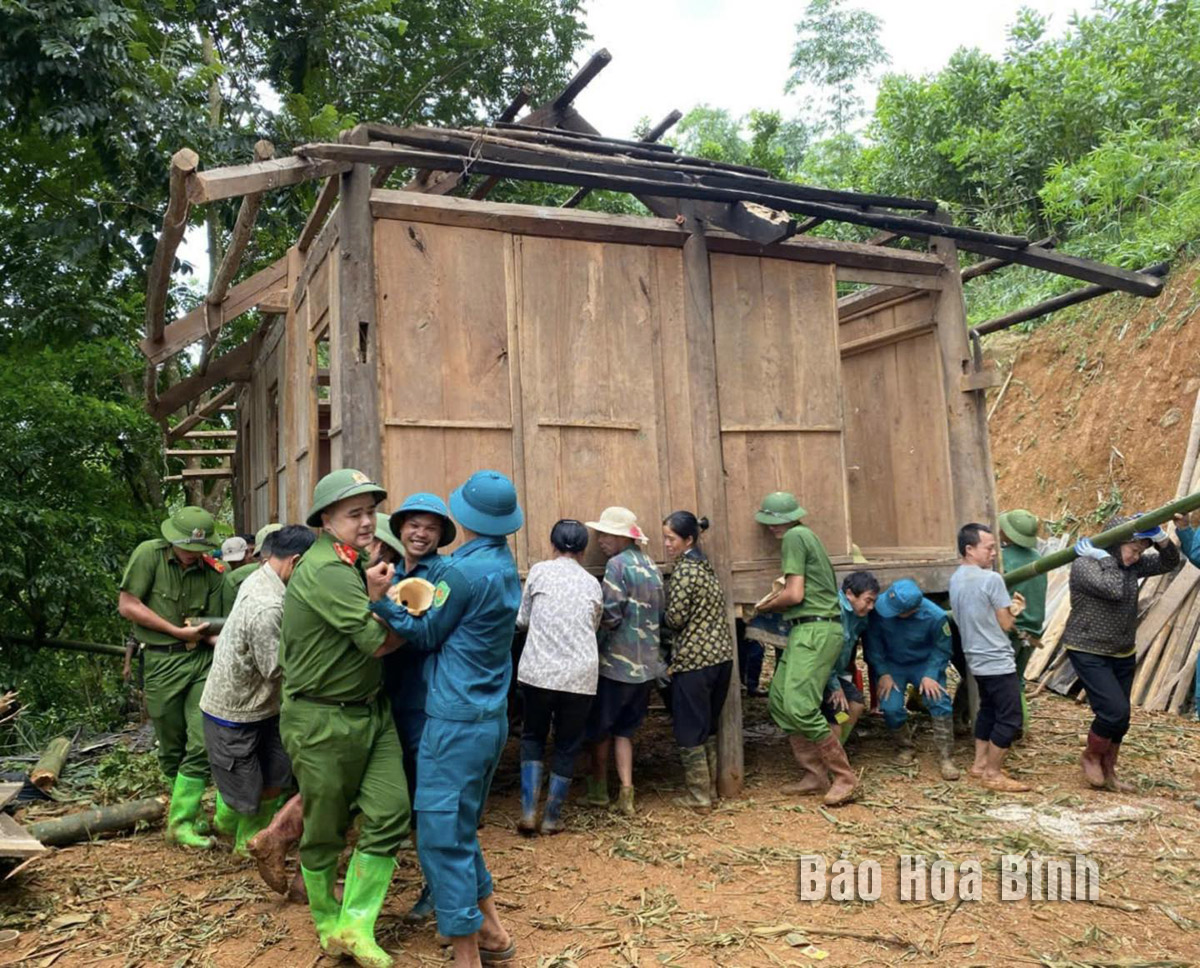
As heavy rainfall caused by Typhoon Yagi and its remnants in Hoa Binh province, the risk of landslides escalates, with several areas marked as extremely high-risk. Provincial public security forces, alongside other agencies, have been working tirelessly to help residents recover from the storm's devastating impact.
Cao Phong district police join forces with others to evacuate Bui Van Thieu’s family from a landslide-prone area in Rom Khanh hamlet.
Following urgent directives from the provincial People's Committee, police forces across the province have responded swiftly and efficiently. With 100% readiness, they have deployed all personnel, launched storm preparedness plans, and pooled resources for flood prevention and search and rescue operations.
Communication lines remain open to address emergencies promptly and support leadership directives effectively. The police have ensured the availability of essential supplies, including raincoats, boots, life jackets, ropes, flashlights, fuel, and food, for officers and those engaged in flood response.
Immediately following the storm's passing, all available resources and equipment have been deployed to minimise damage to life and property and facilitate safe travel for the community.
In Quyet Chien commune, Tan Lac district, heavy rain and strong winds inflicted substantial damage to crops and triggered landslides, affecting several roads. The road from the commune centre to Ca village suffered severe erosion. Local police, military, various departments, and mass organisations swiftly joined forces to repair the damage, assist residents in mobility, and place warning signs indicating hazards.
Driven by a commitment to ensure no one suffers from hunger, cold or danger during the storm, the provincial police have tirelessly pursued rescue and relief efforts.
They continue to collaborate with the army, local authorities, and grassroots political systems to urgently mitigate storm impacts, clear landslide-affected and flooded roads, and help residents repair their homes to restore stability in their lives.
The Standing Board of the Hoa Binh provincial Party Committee has agreed in principle on a proposal by the Standing Board of the Party Committee of Hoa Binh city to gather feedback on the city’s 1:2000 zoning plan, which forms part of its broader urban development strategy.
Hoa Binh province has made notable progress in public administration reform and digital government development, with the satisfaction index among citizens and businesses reaching over 84%, according to recent government evaluations.
Thanks to great efforts by local authorities in recent times, the governance and public administration performance of Mai Chau district has been significantly improved.
In the afternoon of June 6, the Party Committee, the People's Council, the People's Committee and the Fatherland Front of Lac Son district solemnly held a meeting to celebrate the 139th anniversary of the district's founding (1886–2025) and the 79th anniversary of the establishment of the district's Party Committee (1946–2025). There was the attendance of Mr. Bui Van Thang, the Vice Chairman of the Provincial People's Council; Mr. Quach Tat Liem, the Vice Chairman of the Provincial People's Committee; Ms. Dang Bich Ngoc, the Deputy Head of the National Assembly Delegation of the province; as well as the former leaders of the province and district through various periods, who are the natives of the district.
Implementing the Politburo’s Resolution No. 57-NQ/TW on breakthroughs in science – technology, innovation, and digital transformation is a golden opportunity for the northern mountainous province of Hoa Binh to renew growth model, improve competitive edge and shorten digital gap.
Resolution 57-NQ/TW, issued by the Politburo on December 22, 2024, identifies sci-tech, innovation, and digital transformation as strategic breakthroughs to build a developed and prosperous nation. In Hoa Binh province, this spirit is not just a slogan, it’s being put into action through concrete initiatives that form a "new development triangle”: digital citizenship, digital economy, and digital administration.



